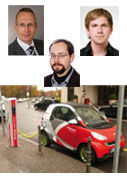Publications Routes/Roads Urban Mobility
This page lists Routes/Roads articles of PIARC in the field of urban mobility. These publications are classified chronologically.
-
Cyclist and pedestrian mobility in France

From revising urban planning around the automobile to supplanting the automobile in favor of alternative modes of transport, France's urban areas are changing with the implementation of new regulatory tools that have fueled many new ideas.[...]
-
Quebec gives its full support to cycling!

The province of Quebec's population of nearly 8 million is concentrated in the Saint-Laurent Valley. Quebec residents must contend with harsh winter conditions that heavily limit bicyclists' activity. Yet despite this constraint, a cycling culture has been ingrained throughout the province unlike any other in North America. Over half of all adult Quebecois ride bikes, with more than a third getting out to pedal at least once a week. The number of cyclists using their bikes for transportation in [...]
-
"Stadtmitte Am Fluss" Saarbruecken moves back to its river

Planning paradigms like the "car-oriented city" have left their visible traces in European cities. Individual districts, as well as highly attractive spaces along rivers and streams, are often separated from the city center by large infrastructure like major streets or railway tracks. As it is very difficult or impossible to remove the infrastructure, so new strategies have to be developed to overcome these major urban barriers. They are barriers both to physical movement of pedestrians, cyclists [...]
-
A smarter way to carshare: the experience in Austin, Texas

Austin, the capital city of Texas, is the 14 th largest city in the United States. It is a city that is known for its environmental and technological innovations and for its commitment to building a more sustainable city.
-
BeMobility: Integrated eCarsharing in Berlin

The "urban millennium" has commenced. The worldwide population residing in urban areas has surpassed the number of people living in rural areas. With many cities confronting rapid urban growth, local transportation systems increasingly suffer from congestion, a lack of accessibility and questionable overall sustainability. New mobility products need to be developed urgently to ease the current situation and mitigate future problems. On the other hand, cities already beyond the rapid growth phase [...]